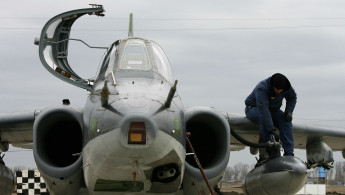Russia coordinates with US, rebels in Syria air campaign
Moscow said on Tuesday it worked with opposition groups in its latest Syrian airstrikes while the US said its pilots communicated with Russian aircraft, in tentative signs the powers are working together to end the civil war ahead of UN talks.
Russian said its jets bombed 24 targets in Syria using coordinates supplied by "opposition representatives", the first time it has claimed to work with those fighting Syria's regime since beginning its air offensive.
"The coordinates of all of these targets were given to us by opposition representatives," senior military official Andrei Kartapolov said, without specifying the groups involved.
Hours later the Pentagon said its fighter pilots communicated directly with Russian jets in the skies over Syria, in the first test of a new strategy to ensure the two sides' parallel campaigns do not boil over into conflict between them.
Washington and Moscow signed an agreement on 20 October laying out rules keep their pilots away from each other in the air, after several close encounters raised the prospect of a mid-air collision or some other dangerous encounter.
| The Pentagon said its fighter pilots communicated directly with Russian jets in Syrian airspace |
A US-led coalition has been bombing Islamic State group (IS) forces since December 2014, while the Russians opened an air campaign in September against a broader range of rebels that Western powers say is designed to support its ally, Syrian President Bashar al-Assad.
The burgeoning coordination between the two comes as Russian Foreign Minister Sergei Lavrov is set to meet the UN Syria envoy Staffan de Mistura in Moscow on Wednesday.
The two met Friday in Vienna alongside top diplomats from 17 other international players including the US, Iran and Saudi Arabia, in the broadest push yet to end the four-year conflict.
The participants - who did not include any representatives of the Syrian government or its opponents - agreed to ask the UN to broker a peace deal between the regime and opposition to clear the way for a new constitution and elections.
But divisions remain on the fate of Assad, with Russia and Iran resisting pressure from Western powers and Saudi Arabia to force the Syrian leader from power.
Syria's deputy foreign minister Faisal Moqdad on Tuesday ruled out any transition period in the war-torn country, insisting that Assad is "the legitimate president elected by the Syrian people."
"United front"
Russia offered on Tuesday to host a meeting between representatives of the Syrian government and rebel groups next week in Moscow, and said it has given Saudi Arabia and the US a list of the opposition figures it is working with.
Moscow said it had set up "working coordination groups" aimed at bolstering the fight against the IS, but that the identities of those involved were being kept secret.
"Such close cooperation will allow us to unite the efforts of the government troops with other patriotic forces in Syria that used to be in the opposition and act as a united front against the common enemy - international terrorism," the defence ministry said.
The latest strikes hit targets close to Palmyra, Deir Ezzor, Ithriya and eastern Aleppo with assistance from the opposition, destroying "terrorist" command posts, munition stores and anti-aircraft artillery, it added.
Moscow has been bombing targets in Syria since 30 September, and said on Tuesday it had hit 2,084 targets in 1,631 sorties, including 52 training camps and 287 command posts, causing "significant losses to the terrorists" and undermining their morale.
"Our aim both in Syria and anywhere else is to fight terrorism first of all," Russian President Vladimir Putin said in Moscow.
The Britain-based Syrian Observatory for Human Rights said warplanes belonging to either Russia or the Syrian regime bombed the IS' de facto capital Raqqa on Tuesday, killing at least 23 people including 13 jihadists.
London on Tuesday denied it was abandoning plans for a parliamentary vote to join air strikes in Syria as an influential committee of lawmakers advised against action.
Newspaper reports suggested Prime Minister David Cameron had abandoned plans to seekparliamentary approval to extend missions against the IS from Iraq into neighbouring Syria.





 Follow the Middle East's top stories in English at The New Arab on Google News
Follow the Middle East's top stories in English at The New Arab on Google News


